You are here
New Releases
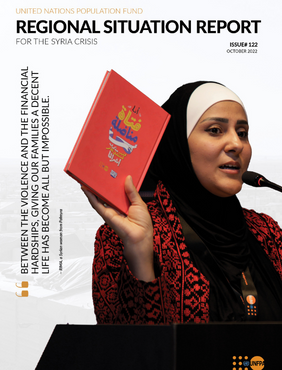
UNFPA Regional Situation Report For the Syria Crisis — October 2022
As of October 2022, Syrians and host communities throughout the region continue to face the escalating impact of a protracted humanitarian crisis, further complicated by a deteriorating economy, continuing hostilities, and chronic and emerging health threats, including an unrelenting pandemic and a worsening cholera out break.
The crisis region, which spans the Whole of Syria, Türkiye, Lebanon, Jordan, Iraq, and Egypt, continues to face a multitude of challenges, particularly in light of the recurrent waves of COVID-19 infections that continue to exacerbate existing needs. A decade into this protracted crisis, people in need continue to endure the cumulative effects of years of instability, the risks of which are even higher now due to the impacts of a far-reaching economic meltdown. The Regional Situation Report for the Syria Crisis offers a bird’s eye view of UNFPA’s operations within the context of the Syria crisis.
The report is prepared by the UNFPA Regional Humanitarian Hub for Syria and the Arab States in Amman, Jordan, and spans operations conducted by UNFPA offices in Türkiye, Lebanon, Jordan, Iraq, and Egypt, in addition to operations conducted inside Syria from Damascus and cross-border via Türkiye. In addition to providing aggregated quantitative results for each country involved in UNFPA’s regional Syria response, this report also brings stories from the field that highlight the plight of communities inside Syria and in host countries, underscoring the positive impact of the response delivered by UNFPA in the areas of sexual and reproductive health, gender-based violence, youth engagement, and others. The report also covers UNFPA’s efforts to ensure continuity of operations throughout the Syria crisis region during the COVID-19 pandemic.
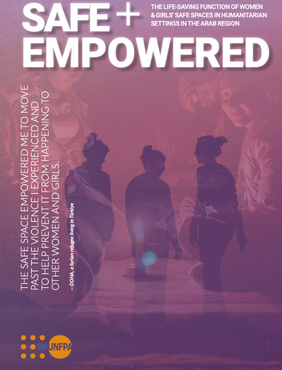
Safe + Empowered: The life-saving function of women & girls’ safe spaces in humanitarian settings in the Arab region
Women and girls’ safe spaces (Safe Spaces) provide a secure, non-stigmatising environment for women and girls and their children to receive comprehensive care services. They constitute an integral, life-saving intervention when programming for gender-based violence (GBV) in emergencies, as outlined in the Inter-Agency Minimum Standards for GBV programming in emergencies.
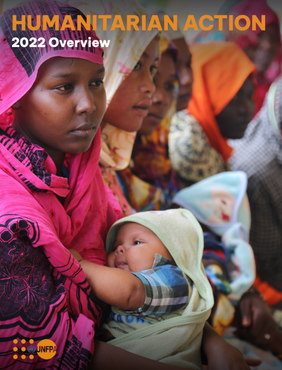
Humanitarian Action Overview 2022
A key strategic shift in the UNFPA Strategic Plan for 2022–2025 is to expand the full spectrum of our humanitarian action to better safeguard the health and lives of women and adolescents. We have mainstreamed resilience, prevention and preparedness and emphasized the complementarity between humanitarian, development and peace-responsive efforts. We are strengthening emergency preparedness, anticipatory action and response systems so that they are more flexible and adaptable. When we anticipate crises, we can work to defuse them before they wreak mass havoc. This is part of our accountability to the people we serve.
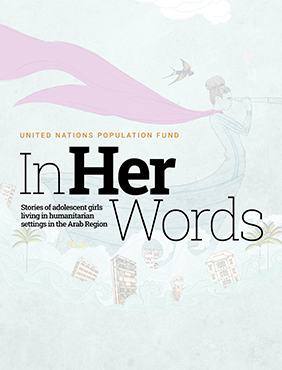
In Her Words - EasyRead Version
In Her Words aims to amplify the voices of adolescent girls in humanitarian settings throughout the Arab region, including Lebanon, Jordan, Iraq, Palestine, and the Whole of Syria. Today, several regions in the Arab states are coping with the lasting impacts of longstanding and emerging humanitarian situations. Both the Syria and Yemen crises have marked their tenth years, while recent developments in Sudan, Ethiopia, and Lebanon have resulted in additional displacements and disruptions in community networks, placing the lives and dignities of millions of people at risk. The lingering effects of the humanitarian situations in Palestine, Iraq, Somalia, and Libya also continue to produce numerous and protracted challenges that require strategic responses. Meanwhile, the worsening impact of the COVID-19 pandemic has only exacerbated the challenges facing communities in those countries, impeding access to lifesaving sexual and reproductive health (SRH) and gender-based violence (GBV) services and resulting in restrictions on movement that have significantly increased the risks of violence against women and girls in communities throughout the region. The pandemic has also intensified the economic fallout of these crises, which in turn have further disrupted social safety nets and increased the likelihood of negative coping mechanisms such as sexual exploitation and child and forced marriages.
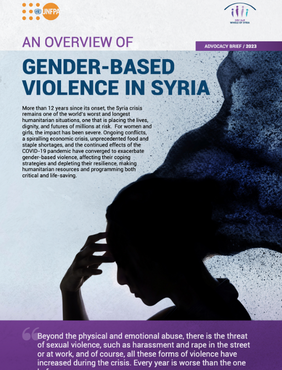
An Overview of Gender-Based Violence in Syria (Advocacy Brief, 2023)
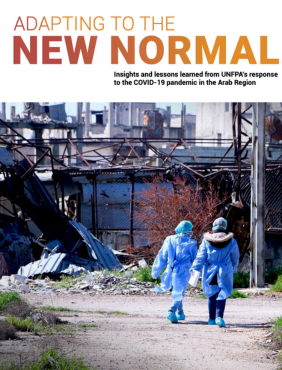
Adapting to the New Normal - Insights and lessons learned from UNFPA’s response to the COVID-19 pandemic in the Arab Region
Two years on, significant progress has been made in the global response to COVID-19. Successful vaccination campaigns and adaptation measures have helped transform a deadly pandemic into a much more manageable health crisis, allowing countries worldwide to begin seeing the light at the end of this dark tunnel. It is at this point in the evolution of the pandemic that humanitarians are encouraged to examine the wealth of knowledge produced throughout this unprecedented crisis — to entrench good practices, learn from missteps, and help communities build greater resilience to future health emergencies.
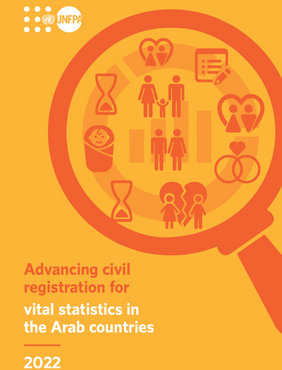
Advancing civil registration for vital statistics in the Arab countries
The Advancing civil registration for vital statistics (CRVS) in the Arab countries report aims at strengthening the civil registry capacity in the Arab countries to achieve full coverage of vital events registering to ensure the individuals rights, as well as to enhance the capacity to produce and disseminate quality vital statistics.
In addition, this report aims at assessing the quality and efficiency of the civil registration and vital statistics system in the Arab countries, in order to mention the challenges facing the functionality of the CRVS and assisting UNFPA countries offices in addressing priorities for improving the system functionality, producing and disseminating vital statistics for evidence based population and development policies and plans.
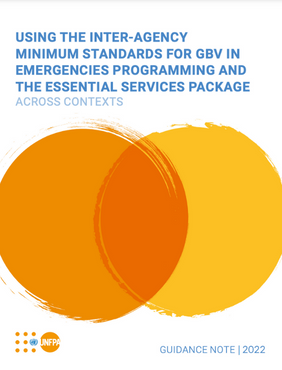
Using the Inter-Agency Minimum Standards For GBV in Emergencies Programming and The Essential Services Package Across Contexts
UNFPA implements programmes addressing gender-based violence (GBV) in 153 countries and territories, many of which face humanitarian emergencies. Leading resources used by GBV practitioners include the Inter-Agency Minimum Standards for Gender-Based Violence in Emergencies Programming (the GBViE Minimum Standards) released in 2019 and the Essential Services Package for Women and Girls Subject to Violence released in 2015.
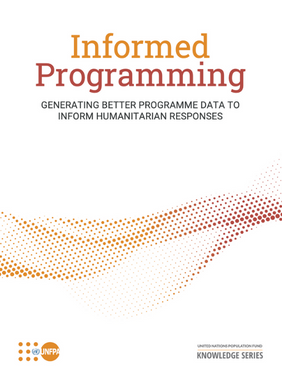
Informed Programming - GENERATING BETTER PROGRAMME DATA TO INFORM HUMANITARIAN RESPONSES
One of the key pillars of effective humanitarian response is the collection of quality data to improve decision making and support advocacy efforts. As needs grow and funding gaps widen, humanitarians are being called upon to strengthen the design, quality, and effectiveness of the programmes being implemented, and to establish knowledge-driven foundations upon which better and more coordinated responses can be developed.
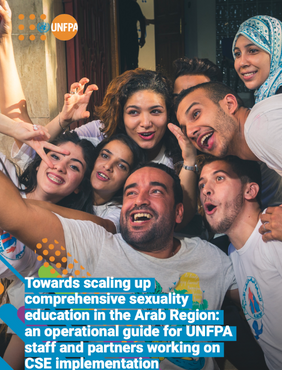
Towards scaling up comprehensive sexuality education in the Arab Region: an operational guide for UNFPA staff and partners working on CSE implementation
This regional operational guide on comprehensive sexuality education (CSE) is intended to help UNFPA personnel in the Arab Region and their CSE implementing partners to better understand and use opportunities to advance CSE in national policies and accountability mechanisms, and to provide UNFPA Country Offices and counterparts with concrete and concise guidance on recommended approaches and possible entry points to plan and lead effective CSE programs in the Region. This operational guide also offers justifications to advocate for favourable policy environments and increased investments in CSE at the Regional level.